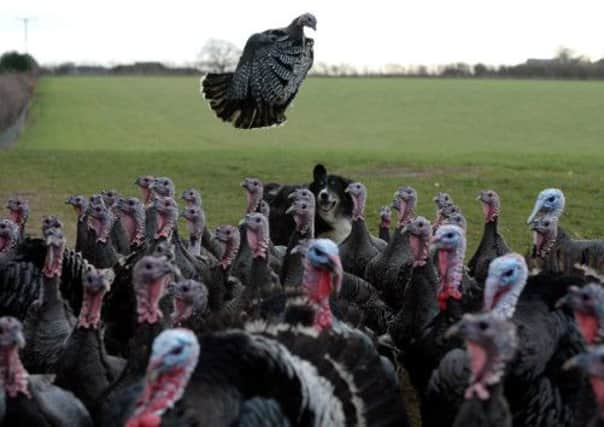Cash-strapped shoppers to cut back at Christmas


But for many people this Yuletide, art will imitate life as cash-strapped households are forced to all but cancel their own Christmases, as they dramatically cut back on food and drink.
One in ten people says a lack of money has meant they have had to cancel plans to have a Christmas turkey this year in a bid to save cash, according to a new report.
Advertisement
Hide AdAdvertisement
Hide AdMeanwhile, separate data shows that families will be spending 15 per cent less this year on festive food and drink than last year – and under half the amount they were able to afford in 2011.
A survey from vouchercodes.co.uk found that the average spend on Christmas food and drink will come to £125 this year – compared to £264 two years ago. Last year, the typical household splashed out an extra £18 on Christmas treats.
Householders say a combination of higher utility bills and squeezed pay packets have forced them to cut back.
Two-fifths of people said that the added financial burden of having guests in the house over Christmas is putting them under further pressure this year.
“Despite being a season to enjoy themselves, consumers are feeling the financial burn more than ever this year,” said Anita Naik, lifestyle editor of vouchercodes.co.uk
“Christmas can be a hard time of year to get the balance right between splurging on treats and covering essential costs.
“It is sad to see that, for the second year running, families are forced to cut back further on their Christmas groceries to stay afloat – especially as indulging in festive food and drink is widely seen as one of the main things to look forward to.”
The 45 to 54 age group are the most extravagant shoppers, with an average spend of £178 this year, the survey found, compared to the 18 to 24 age group, who said they would spend just £98.
Advertisement
Hide AdAdvertisement
Hide AdA separate report, from energy comparison website uSwitch.com, found that almost two-thirds of people questioned will spend less on overall Christmas festivities than a year ago – cutting back on such perceived luxuries as a real Christmas tree and socialising with friends.
A third admit they will cut down on the amount they spend on presents, while one in ten people plans to forego the traditional turkey in favour of a cheaper menu.
“The cost of Christmas is now so high and consumer budgets so tight, that a time of year traditionally full of joy and festive spirit is clouded with worry and financial woe,” said Michael Ossei, personal finance expert at uSwitch.com.
Russell Hamblin-Boone, chief executive of the Consumer Finance Association, said: “With the rising cost of living, people are being sensible this Christmas and not only thinking hard about how much they spend, but also where the money is coming from.
“They still want to be generous to loved ones and have a good time, but have acknowledged that their pay cheques are under pressure.”
1 in 3 people financed festivities by credit card last year, says poll
Nearly a third of people financed Christmas with credit cards last year, a report reveals.
A fifth of people went over budget with spending, with some missing credit card payments as a result, the poll by information services provider Experian found.
Advertisement
Hide AdAdvertisement
Hide AdMeanwhile, another survey found around seven million British adults will take out a loan to cover Christmas costs.
The survey, by affordable homes provider Circle Housing, found more than a third of borrowers will use loans to pay winter energy bills and around four million people need help to put festive food on the table. One in 20 borrowers will use a payday loan and nearly 150,000 adults will go to an unofficial lender.
Matt Gaskin, group financial inclusion officer for Circle Housing, said: “With the recent rises in energy bills we are more worried than ever before that people will turn to payday lenders or loan sharks, particularly some of the most vulnerable sections of society.”
Experian consumer affairs head James Jones said: “Over-reliance on credit cards, above and beyond what we have budgeted for, can potentially damage your creditworthiness into New Year.”